MED News 01/2019
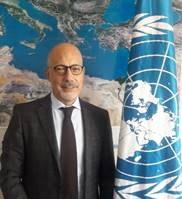 Editorial
Editorial
By Gaetano Leone, Coordinator, UNEP/MAP – Barcelona Convention Secretariat
The time is ripe for decisive action to accelerate the transition to sustainability in the Mediterranean. As we collectively prepare for the 21st Meeting of the Contracting Parties to the Barcelona Convention (COP21), let us to take a moment to reflect on what the Mediterranean Action Plan – Barcelona Convention system has accomplished thus far and on what we can do to turn the tide on environmental degradation. The Contracting Parties have built a comprehensive legal and institutional framework encompassing key building blocks for sustainability in the Mediterranean. The network of Regional Activity Centres is providing our community with the required scientific and technical expertise to move forward. What can we do more to ensure that these achievements can translate into a decisive shift to sustainability in the Mediterranean? At this stage, the answer to this question is two-fold: compliance with and full implementation of the Barcelona Convention and its Protocols. The Coordinating Unit of the UN Environment/MAP will continue to support Contracting Parties and Partners to make the much-needed progress on capacity-building and resource-mobilization in these areas. But let us remember that the Barcelona Convention is much more than a legal text: it epitomizes the essence of multilateralism and basin-wide solidarity that constitute our greatest strength.
15 July 2019
International Workshop «Implementation of Nature Based Solutions to tackle climate change: Focus on the Mediterranean region»
The workshop, organized by Plan Bleu, IUCN Centre for Mediterranean Cooperation, UICN French Committee, Conservatoire du Littoral, Tour du Valat, MedWET and Wetlands International, brought together in Marseille, on 22-24 January 2019, researchers, ...
The workshop, organized by Plan Bleu, IUCN Centre for Mediterranean Cooperation, UICN French Committee, Conservatoire du Littoral, Tour du Valat, MedWET and Wetlands International, brought together in Marseille, on 22-24 January 2019, researchers, practitioners and policy makers of the Mediterranean region and European Union to discuss on the benefits and challenges related to Nature Based Solutions implementation. More information…

Latest CO-EVOLVE video is out
We are pleased to inform you that a video on testing activities performed within the CO-EVOLVE project is now out and available on YouTube: More information...
We are pleased to inform you that a video on testing activities performed within the CO-EVOLVE project is now out and available on YouTube: More information...
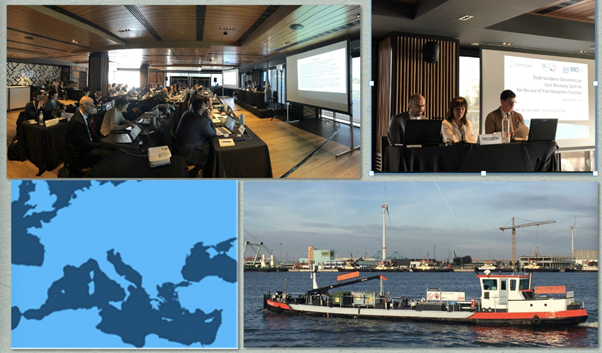
New guidelines targeting the better management of marine litter from sea-based sources in ports and marinas in the Mediterranean discussed in Seville, Spain
The Regional Marine Pollution Emergency Response Centre for the Mediterranean Sea (REMPEC) participated in the Second Regional Meeting on Marine Litter Best Practices, jointly organised by the Mediterranean Action Plan (MAP) of the United Nations ...
The Regional Marine Pollution Emergency Response Centre for the Mediterranean Sea (REMPEC) participated in the Second Regional Meeting on Marine Litter Best Practices, jointly organised by the Mediterranean Action Plan (MAP) of the United Nations Environment Programme (UNEP) with the MARLICE 2019 International Forum on Marine Litter and Circular Economy, which was convened in Seville, Spain, from 8 to 10 April 2019.....Read more
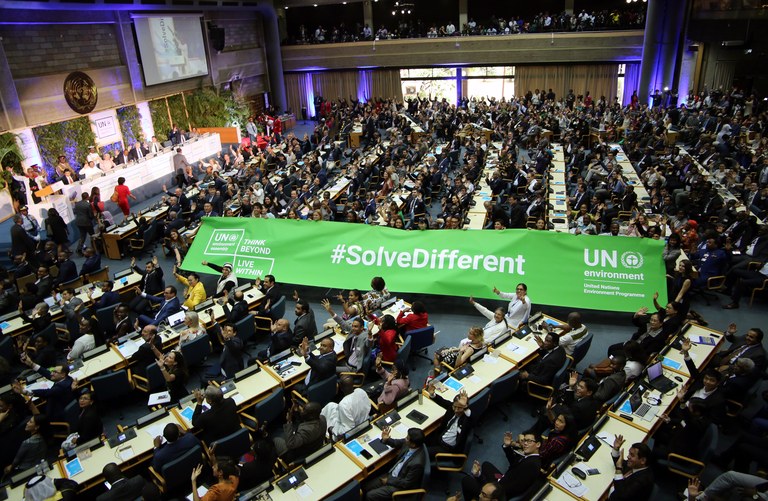
MAP voice heard at the UN Environment Assembly (Nairobi, Kenya, 11-15 March 2019)
The Fourth session of the United Nation Environment Assembly (UNEA-4, Nairobi, Kenya, 11-15 March 2019) addressed issues at the core of the UNEP/MAP work, including marine plastic litter and microplastics and the protection of the marine environment ...
The Fourth session of the United Nation Environment Assembly (UNEA-4, Nairobi, Kenya, 11-15 March 2019) addressed issues at the core of the UNEP/MAP work, including marine plastic litter and microplastics and the protection of the marine environment from land-based activities. The Coordinator of the UNEP/MAP – Barcelona Convention Secretariat Gaetano Leone spoke at thematic sessions pertaining to synergies between Multilateral Environmental Agreements -- particularly on Biodiversity and Chemicals --; addressing pollution in Southern Europe and financing instruments to curb marine litter.
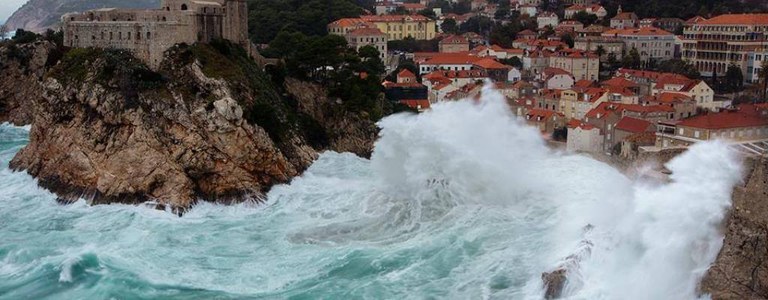
A resilience information platform for Adriatic cities in development
PAP/RAC has launched the initial activities of the new EU funded project “Adriadapt” – A resilience information platform for Adriatic cities and towns. This 2-year project is funded under the EU INTERREG Italy - Croatia CBC Programme - Standard ...
PAP/RAC has launched the initial activities of the new EU funded project “Adriadapt” – A resilience information platform for Adriatic cities and towns. This 2-year project is funded under the EU INTERREG Italy - Croatia CBC Programme - Standard projects. In addition to CMCC Foundation, as lead partner, and PAP/RAC, the following partners are involved: Croatian Meteorological and Hydrological Service, IUAV University of Venice, Union of the Municipalities of Savio Valley, Regional Agency for Prevention, Environment and Energy of Emilia Romagna Region, Municipality of Udine, Municipality of Cervia, Society for Sustainable Development Design, Šibenik-Knin County and City of Vodice.
The project objectives are the following: to harmonize and improve available climate-related knowledge and prepare it for the use in the decision-making process; to create a climate information system or a knowledge platform for the Adriatic region containing best practices, guidance documents, legal frameworks and climate and vulnerability studies, to foster the design of multi-scale adaptation and resilience plans and measures, which will support safe and sustainable socio-ecological systems, linking natural, social and economic dynamics that cross transversally from the inland, coastal and marine areas in the two partner countries; to test and integrate the knowledge platform with partners from the participating Italian and Croatian pilot cases; and to maintain and disseminate the information contained in the knowledge platform as a region specific repository for climate policy and plans, which provides support and locally relevant information aiming at climate resilience planning. PAP/RAC will secure transfer of relevant knowledge to other Mediterranean coastal stakeholders.
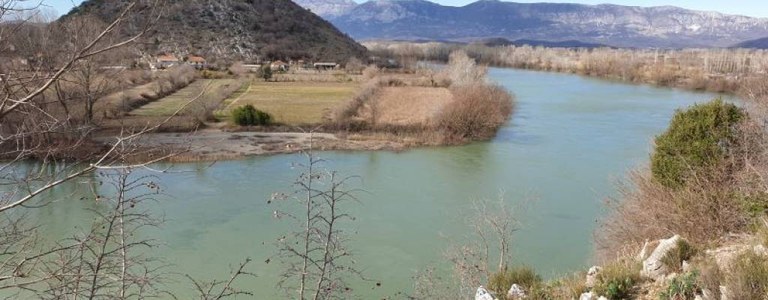
Governance of Buna delta in Albania
In the frame of the overarching project “Governance and stakeholders participation in coastal wetlands management”, the pilot site workshops on Buna Delta Protected Landscape (BDPL) were organised in Albania, on 12 and 13 February 2019. The first ...
In the frame of the overarching project “Governance and stakeholders participation in coastal wetlands management”, the pilot site workshops on Buna Delta Protected Landscape (BDPL) were organised in Albania, on 12 and 13 February 2019. The first day, the meeting took place at the premises of the Regional Agency for Protected Areas (RAPA) in Shkodra and was attended by 15 participants, including representatives of RAPA and the Municipality of Shkodra, the Institute for Nature Conservation in Albania (INCA), PAP/RAC and its project partners (IUCN, GWP Med), and local experts on governance issues. The objective was to discuss issues related to governance in the pilot area so to assess the needs and gaps currently faced in the area, as well as to discuss the future options for better governance, including the establishment of a Management Committee which is under progress. The following day, the workshop was held at INCA premises in Tirana with participation of INCA staff and its experts, as well as a National Agency for Protected Areas (NAPA) representative. The purpose was to discuss the draft answers provided by INCA to the questionnaire on needs assessment for the governance in BDPL. A very rich discussion was developed and lots of information and proposals were gathered that will be used also to illustrate the Handbook on governance, which is the main output of the project. The last session was dedicated to training/capacity building on “Governance” presented by Mr. B. Shipman, the lead expert on this project activity. The project is financed by the MAVA Foundation.
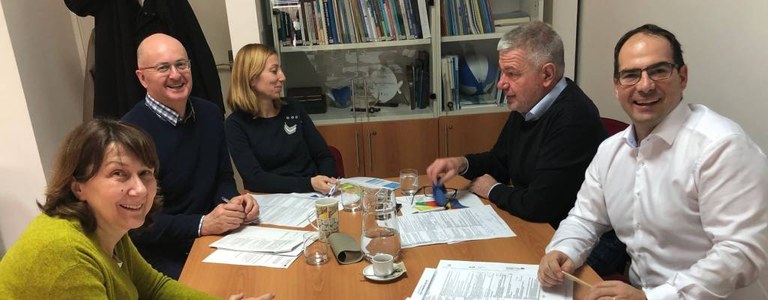
Project concept on ICZM/MSP for EUSAIR
On 5 February 2019, PAP/RAC hosted a meeting with the European Union Strategy for the Adriatic-Ionian Region (EUSAIR) Facility Point and Thematic Steering Group (TSG) 3 Pillar Coordinator with the objective to assist the preparation of the project ...
On 5 February 2019, PAP/RAC hosted a meeting with the European Union Strategy for the Adriatic-Ionian Region (EUSAIR) Facility Point and Thematic Steering Group (TSG) 3 Pillar Coordinator with the objective to assist the preparation of the project concept on ICZM and MSP for the Adriatic-Ionian (AI) sub-region. “To promote a sustainable growth of the AI region by implementing ICZM and MSP also to contribute to the Common Regional Framework (CRF) of the Barcelona Convention” is one of the project proposals currently under development for the implementation of this Mediterranean sub-regional strategy. The Centre’s contribution is with its region-wide expertise on the subjects, as well as to guarantee the best possible synergies and complementarities between the EUSAIR and the Barcelona Convention. Concrete outputs and related activities were discussed and four testing areas proposed. The proposal will be presented to the countries at the upcoming EUSAIR meeting to be held in Zagreb, Croatia.
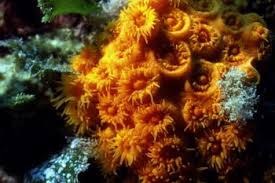
Meeting of Experts on the finalization of the Classification of benthic marine habitat types for the Mediterranean region and the Reference List of Marine and Coastal Habitat Types in the Mediterranean (Rome, Italy, 22-23 January 2019)
The meeting, organized by the Specially Protected Areas Regional Activity Centre (SPA/RAC) of UN Environment/MAP, was attended by 18 Contracting Parties to the Barcelona Convention and its Protocols and two observer organizations. The meeting ...
The meeting, organized by the Specially Protected Areas Regional Activity Centre (SPA/RAC) of UN Environment/MAP, was attended by 18 Contracting Parties to the Barcelona Convention and its Protocols and two observer organizations. The meeting benefitted from a very active and substantive contribution of all participants representing the Contracting Parties and the partner organizations. The objectives of the meeting were to review and transmit to the SPA/BD Thematic Focal Points meeting: a) the Classification of benthic marine habitat types for the Mediterranean region, and, b) the Reference List of Marine and Coastal Habitat Types in the Mediterranean. Both lists were reviewed in depth and approved leading to an important achievement for marine biodiversity in the Mediterranean. Following its formal approval by the forthcoming SPA/BD Thematic Focal Points meeting, both lists will be submitted in a draft decision for review by COP 21 of the Barcelona Convention and its Protocols (Naples Italy, 2-5 December 2019). It should be noted that the reference list of marine and coastal habitats in the Mediterranean is of major importance for the promotion of conservation actions and the establishment of MPAs and/or SPAMIs.
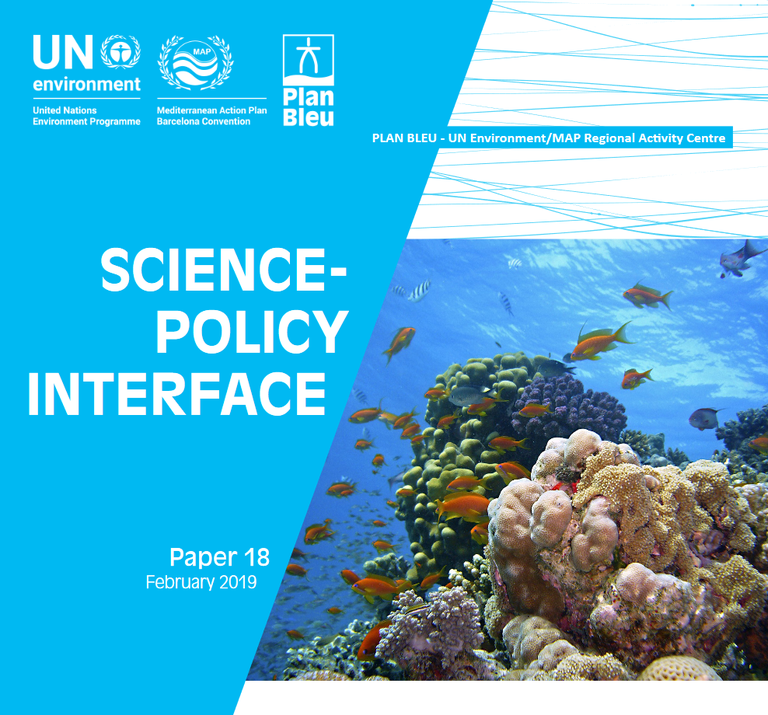
Science-Policy Interface (SPI) to support monitoring implementation plans as well as sub-regional and regional policy-developments.
EcAp clusters on: pollution, contaminants and eutrophication, marine biodiversity and fisheries, coast and hydrography
This new report provides Mediterranean stakeholders with key recommendations and conclusions that emerge from three workshops to support the roadmap for the implementation of Ecosystem Approach (EcAp) and of Integrated Monitoring and Assessment ...
This new report provides Mediterranean stakeholders with key recommendations and conclusions that emerge from three workshops to support the roadmap for the implementation of Ecosystem Approach (EcAp) and of Integrated Monitoring and Assessment Programme of the Mediterranean Sea and Coast (IMAP) decisions by strengthening SPI. Download the report
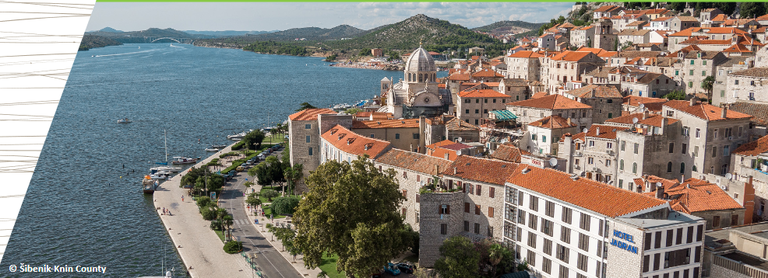
Climagine, co-building the coast of the future
Mediterranean coastlines are places of strategic importance, which are home to a rich diversity of ecosystems. However, they also face numerous pressures. For over twenty years, the International Panel on Climate Change (IPCC) has warned that these ...
Mediterranean coastlines are places of strategic importance, which are home to a rich diversity of ecosystems. However, they also face numerous pressures. For over twenty years, the International Panel on Climate Change (IPCC) has warned that these fragile zones could be severely impacted by climate change. Integrated Coastal Zone Management (ICZM) is recognised as the best way to promote the sustainable development of these vulnerable spaces and it now fully incorporates this issue. However, the participatory nature of ICZM means that it faces a major challenge in order to give stakeholders the tools they need to jointly plan their territory while taking into account the impacts of climate change. A new method, known as Climagine, has been developed to meet this need. More information…
20th Meeting of the Steering Committee of the Mediterranean Commission on Sustainable Development (MCSD), Athens (Greece, 23-24 January 2019)
The purpose of this meeting was to review the progress and perspectives in the work of the MCSD, in particular regarding the implementation and follow-up of the Mediterranean Strategy for Sustainable Development (MSSD), and to discuss the ...
The purpose of this meeting was to review the progress and perspectives in the work of the MCSD, in particular regarding the implementation and follow-up of the Mediterranean Strategy for Sustainable Development (MSSD), and to discuss the preparation of the 18th Meeting of the MCSD to be held in Budva, Montenegro, from 11-13 June 2019. The meeting addressed the following topics: update of the list of indicators of the Mediterranean Sustainability Dashboard; forthcoming evaluation of MAP Regional Strategies, including participatory mid-term evaluation of the MSSD; assessment studies (2019 State of the Environment and Development Report/SoED 2019, Foresight Study on the Environment and Development in the Mediterranean/MED 2050, including Case Studies on the Blue Economy); second edition (2018-2019) of the Simplified Peer Review Mechanism (SIMPEER); MSSD Flagship Initiatives; second edition (2018-2019) of the Istanbul Environment Friendly City Award; and membership of the MCSD from 2020. The meeting was also instrumental for the preparation of the 18th Meeting of the MCSD.
Further sub-regional cooperation on marine pollution in the Eastern Mediterranean Region
Following the signature of the Implementation Agreement on the Sub-regional Marine Pollution Contingency Plan between Cyprus, Greece and Israel in May 2018, REMPEC facilitated a follow-up meeting which took place on 6 December 2018 in Larnaca, ...
Following the signature of the Implementation Agreement on the Sub-regional Marine Pollution Contingency Plan between Cyprus, Greece and Israel in May 2018, REMPEC facilitated a follow-up meeting which took place on 6 December 2018 in Larnaca, Cyprus. During the meeting, the three countries made considerable progress on ensuring the efficient implementation of their common contingency plan, and addressed operational matters, trans-national issues and compliance with IMO’s Convention on Oil Pollution Preparedness and Response (OPRC 90). REMPEC provided valuable input to the discussions based on its extensive experience in developing national and (sub)regional contingency plans in other parts of the Mediterranean.
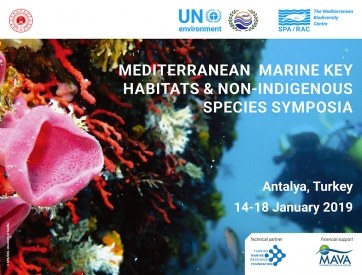
Mediterranean symposia on marine key habitats and non-indigenous species: a scientific gathering to share knowledge and foster marine biodiversity conservation
Scientists and researchers from all over the Mediterranean have gathered in Antalya from 14 to 18 January 2019 to exchange knowledge on marine biodiversity conservation and enhance cooperation to achieve the good environmental status of the Mediterranean Sea.
The Specially Protected Areas Regional Activity Centre (SPA/RAC) organized the Mediterranean symposia on marine key habitats and non-indigenous species, in collaboration with the Turkish Ministry of Environment and Urbanization and the Turkish ...
The Specially Protected Areas Regional Activity Centre (SPA/RAC) organized the Mediterranean symposia on marine key habitats and non-indigenous species, in collaboration with the Turkish Ministry of Environment and Urbanization and the Turkish Marine Research Foundation (TUDAV), as follows:
- 6th Mediterranean symposium on marine vegetation (from 14 to 15 January 2018)
- 3rd Mediterranean symposium on the conservation of coralligenous and other calcareous bio-concretions (from 15 to 16 January 2018)
- 2nd Mediterranean symposium on the conservation of the dark habitats (16 January 2018)
- 1st Mediterranean symposium on the non-indigenous species (from 17 to 18 January 2018)
The symposia aim essentially at providing an opportunity to exchange the most recent scientific information on marine biodiversity conservation while promoting the cooperation between specialists working on the Mediterranean Sea.
Key note conferences, oral communications, poster sessions and round tables were organized to present the most recent studies dealing with marine key habitats and species introduction in the Mediterranean, and to discuss the best strategies of biodiversity conservation and restoration in the Mediterranean Sea.
“The symposia are also a good opportunity to discuss new topics such as the monitoring, the definition of Good Environmental Status in the Mediterranean and to strengthen links between scientists and scientific institutions”, says Khalil ATTIA, SPA/RAC Director.
Furthermore, a photographic exhibition was held at the conference venue. 26 panels were displayed, presenting marine landscapes made up of marine vegetation meadows, corals, dark habitats, as well as non-indigenous species in the Mediterranean Sea. The pictures were taken by Mathieu FOULQUIÉ and Renaud DUPUY DE LA GRANDRIVE, two naturalists, marine biologists, divers and photographers.
The Mediterranean symposia on marine key habitats and non-indigenous species held in Turkey were financed by the MAVA Foundation and the Mediterranean Trust Fund.
The proceedings of the four symposia are available at the following links:
- http://rac-spa.org/sites/default/files/symposium/proceedings_msmv_2019_final.pdf
- http://rac-spa.org/sites/default/files/symposium/proceedings_msnis_2019_final.pdf
- http://rac-spa.org/sites/default/files/symposium/proceedings_mscc_2019_final.pdf
- http://rac-spa.org/sites/default/files/symposium/poceedings_msdh_2019_final.pdf
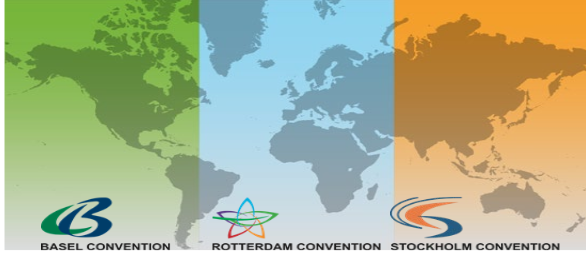
Consultation meetings between UN Environment/MAP and Basel-Rotterdam-Stockholm (BRS) Conventions Secretariat, Minamata Convention Secretariat and UN Environment/Chemicals (Geneva, Switzerland, 8 January 2019)
On 7 December 2018, UN Environment/MAP and the BRS Conventions Secretariat signed an updated MoU. With the view to define concrete activities of common interest and where possible joint activities, a bilateral meeting was held on 8 January 2019 in ...
On 7 December 2018, UN Environment/MAP and the BRS Conventions Secretariat signed an updated MoU. With the view to define concrete activities of common interest and where possible joint activities, a bilateral meeting was held on 8 January 2019 in Geneva, Switzerland, between the UN Environment/MAP-Barcelona Convention Secretariat (lead by Gaetano Leone, Coordinator) and the BRS Conventions Secretariat (lead by Rolph Payet, Executive Secretary). Furthermore, on the same date, similar bilateral consultations were held between UN Environment/MAP and the Minamata Convention Secretariat, as well as between UN Environment/MAP and UN Environment/Chemicals. The main objective of these consultations was to maximize synergies and interactions between relevant work at the global and at the regional levels.
87th Meeting of the Bureau of the Contracting Parties to the Barcelona Convention and its Protocols, Athens, Greece, 6–7 November 2018.
The 87th Meeting of the Bureau of the Contracting Parties to the Convention for the Protection of the Marine Environment and the Coastal Region of the Mediterranean (Barcelona Convention) and its Protocols was held on 6 – 7 November 2018. The Bureau ...
The 87th Meeting of the Bureau of the Contracting Parties to the Convention for the Protection of the Marine Environment and the Coastal Region of the Mediterranean (Barcelona Convention) and its Protocols was held on 6 – 7 November 2018. The Bureau discussed the Progress Report for the period April - September 2018, the Report by the Secretariat on Financial and Administrative Issues, as well as a number of Specific Issues, in particular: a) the Status of Ratification of the Barcelona Convention and its Protocols, b) the Development of Host Country Agreements for Regional Activity Centres, c) the Meeting of Thematic Focal Points for Specially Protected Areas/Biodiversity, d) Compliance and Reporting, e) Cooperation and Partners, f) the Preparation of Assessment Reports, g) Outreach, Information and Communication, and h) Preparations for COP 21 of the Barcelona Convention and its Protocols. The meeting adopted a set of conclusions and recommendations, prepared in accordance with the Terms of Reference of the Bureau, included in the Report of the Meeting (document UNEP/MED BUR.87/7).
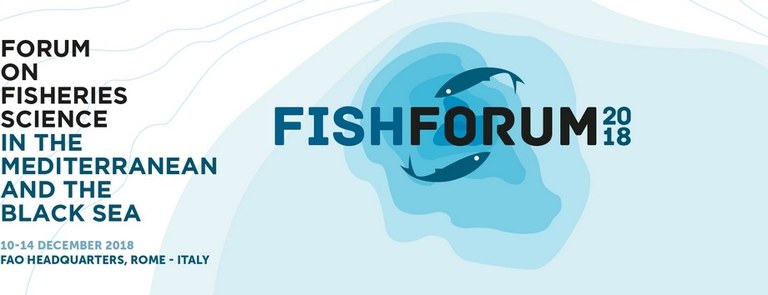
Side-event and workshops at the Forum on Fisheries science in the Mediterranean and the Black Sea, Rome, Italy, 10-14 December.
MAP successfully organized a side-event and two workshops at the “Forum on Fisheries science in the Mediterranean and the Black Sea” organized by the General Fisheries Commission for the Mediterranean (FAO-GFCM) in Rome on 10-14 December 2018. The ...
MAP successfully organized a side-event and two workshops at the “Forum on Fisheries science in the Mediterranean and the Black Sea” organized by the General Fisheries Commission for the Mediterranean (FAO-GFCM) in Rome on 10-14 December 2018. The side-event and the workshops focused on (i) “Implementation of the ecosystem approach at the regional level for the coordinated achievement of the SDG14 targets”, (ii) “Priority actions to prevent and reduce the generation of marine litter” and (iii) “Complementarities between MPAs and fisheries spatial measures for area-based management”. The Forum fully achieved its goal to bring together the wider community of scientists, experts and government representatives working on fisheries and the marine environment in the Mediterranean and Black Sea in order to build a lasting network, discuss advancements in research and integrate scientific knowledge in support of decision-making. More information....
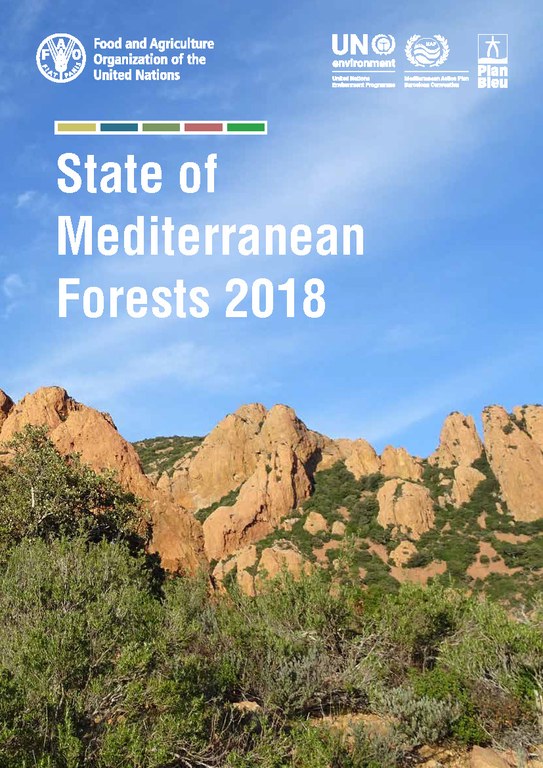
State of Mediterranean Forests 2018
According to the new FAO and Plan Bleu report published at the end of 2018, the Mediterranean forest areas, while having increased by 2% between 2010 and 2015, have experienced in recent years a serious degradation and are increasingly threatened by ...
According to the new FAO and Plan Bleu report published at the end of 2018, the Mediterranean forest areas, while having increased by 2% between 2010 and 2015, have experienced in recent years a serious degradation and are increasingly threatened by the climate change, population growth, forest fires and water scarcity. Download the report…
Promoting spill prevention and response in Western Mediterranean
REMPEC facilitated the organization of the Fifth Meeting of the competent national authorities in charge of the implementation of the Sub-Regional Contingency Plan between Algeria, Morocco and Tunisia for the Preparedness for and Response to Marine ...
REMPEC facilitated the organization of the Fifth Meeting of the competent national authorities in charge of the implementation of the Sub-Regional Contingency Plan between Algeria, Morocco and Tunisia for the Preparedness for and Response to Marine Pollution from Ships for the South-Western Mediterranean, held in Algiers, Algeria from 27 to 28 November.
The meeting fell within REMPEC’s continuous efforts to implement a solid framework for mutual assistance and cooperation in case of marine pollution from ships in the Mediterranean. It was attended by more than 150 representatives from Algeria, Morocco, Tunisia, as well as from the Unites Nations and the United Nations Development Programme (UNDP). As facilitator, REMPEC helped further collaboration and exchange of experience between the South-Western Mediterranean Contingency Plan, and the RAMOGE Agreement, a similar regional cooperation framework between France, Italy and Monaco which has been in place for more than 40 years.
Mid-term Conference of InnoBlueGrowth Project on blue economy
The mid-term conference "Blue Economy: The Blue Way of Life", organized by the partners of the InnoBlueGrowth project (including Plan Bleu), took place on November 22nd and 23rd 2018 in Barcelona bringing together about fifty experts and actors of ...
The mid-term conference "Blue Economy: The Blue Way of Life", organized by the partners of the InnoBlueGrowth project (including Plan Bleu), took place on November 22nd and 23rd 2018 in Barcelona bringing together about fifty experts and actors of Blue Growth in the Mediterranean to discuss the challenges and opportunities of the blue economy, innovation and sustainability models of governance and regional cooperation. More information…
1st Regional Meeting of Experts on the Six Pollution Reduction Regional Plans, Athens, Greece, 20–21 November 2018.
The 1st Regional Meeting of Experts on the Six Pollution Reduction Regional Plans was held in Athens on 20 – 21 November. The meeting was organized by MAP’s Programme for the Assessment and Control of Marine Pollution in the Mediterranean (MEDPOL). ...
The 1st Regional Meeting of Experts on the Six Pollution Reduction Regional Plans was held in Athens on 20 – 21 November. The meeting was organized by MAP’s Programme for the Assessment and Control of Marine Pollution in the Mediterranean (MEDPOL). The meeting reviewed the main elements and added value expected to be embedded in six new Regional Plans on municipal wastewater treatment plants; sewage sludge management; agriculture nutrients management; aquaculture nutrients management; marine litter management and storm water management. The meeting acknowledged the need for a strong involvement of local and regional expertise to show and benefit from best practices in the region for the preparation of the Regional Plans as well as the leadership of the Contracting Parties in this process. The meeting recommended that the Secretariat continues working on the elements of the six Regional Plans with the aim of presenting concrete proposals for the MEDPOL Focal Points Meeting in May 2019.
Side-Event at the Sustainable Blue Economy Conference, Nairobi, Kenya, 28 November.
MAP and its Plan Bleu Regional Activity Center have joined forces with the Secretariat of the Union for the Mediterranean (UfM) and WWF Mediterranean to organize a side event focusing on the Mediterranean at the Sustainable Blue Economy Conference in Nairobi. The side-event entitled ‘The regional dimension of a sustainable and inclusive Blue Economy: the model of the Mediterranean’ aimed to foster improved models of regional cooperation to promote the achievement of a truly sustainable and inclusive Blue Economy.
